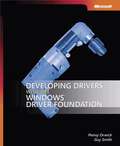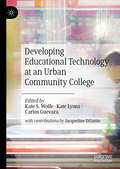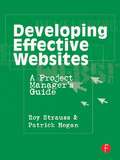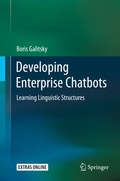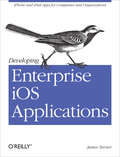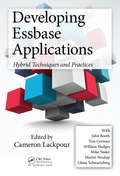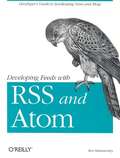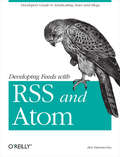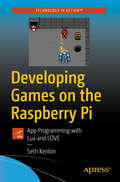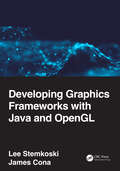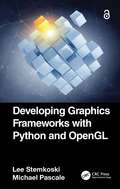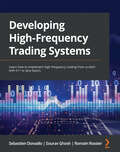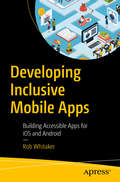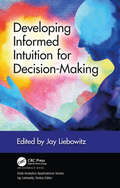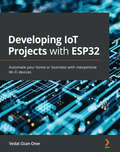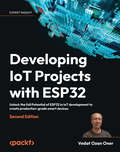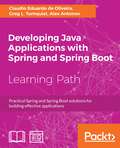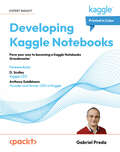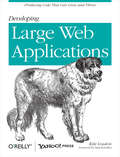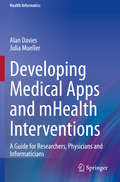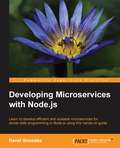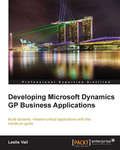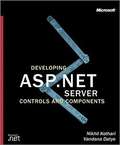- Table View
- List View
Developing Drivers with the Windows® Driver Foundation
by Penny Orwick Guy Smith<div xmlns="http://www.w3.org/1999/xhtml"><p>Get expert insights for mastering the intricacies of the Windows Driver Foundation. This in-depth reference delivers strategic guidance and practical advice for developing drivers for the Windows platform. Code samples in Microsoft Visual C++\xae.</p></div>
Developing Educational Technology at an Urban Community College
by Jacqueline DiSantoThis book uses a mix of personal narratives, anecdotal evidence, and research-based findings to tell the story of a small, urban community college’s efforts to develop and nurture a Community of Practice (CoP) that would galvanize the campus’ adoption of Educational Technology. Located in one of the poorest congressional district in the United States, Hostos Community College, a Hispanic-serving institution and part of the City University of New York (CUNY), has a unique history rooted in activism, advocacy, and community outreach, and has built a reputation for technology innovation. This book is a collection of writing from faculty and staff members whose decades of experience integrating technology into the classroom pre-dates many of the official initiatives now in place at CUNY.
Developing Effective Websites: A Project Manager's Guide
by Patrick Hogan Roy StraussIs your website project out of control?Every website project needs a manager. Developing Effective Websites describes Internet technologies in plain language and helps you see beyond your expertise to the big picture. It does this by drawing on established software project and management principles. Like any project, effective management of website development starts by understanding and balancing the constraints of time, resources, and tasks. You can deliver your project on time and on budget, by following a process that includes:· Analyzing the requirements of users and your market· Developing a workplan for the site and breaking it down to tasks· Scheduling with Gantt and PERT charts and measuring slippage for more accurate revisions· Estimating cost by the budget-first or design-first methods · Using the team development process and covering all the necessary roles· Aligning contractor and client interests to create a win-win relationship· Following an iterative development process for designing, prototyping, and building out· Applying software testing principles to website development· Making hosting decisions and planning for maintenance
Developing Enterprise Chatbots: Learning Linguistic Structures
by Boris GalitskyA chatbot is expected to be capable of supporting a cohesive and coherent conversation and be knowledgeable, which makes it one of the most complex intelligent systems being designed nowadays. Designers have to learn to combine intuitive, explainable language understanding and reasoning approaches with high-performance statistical and deep learning technologies. <p><p> Today, there are two popular paradigms for chatbot construction: <p> 1. Build a bot platform with universal NLP and ML capabilities so that a bot developer for a particular enterprise, not being an expert, can populate it with training data; <p> 2. Accumulate a huge set of training dialogue data, feed it to a deep learning network and expect the trained chatbot to automatically learn “how to chat”. <p> Although these two approaches are reported to imitate some intelligent dialogues, both of them are unsuitable for enterprise chatbots, being unreliable and too brittle. <p> The latter approach is based on a belief that some learning miracle will happen and a chatbot will start functioning without a thorough feature and domain engineering by an expert and interpretable dialogue management algorithms. <p> Enterprise high-performance chatbots with extensive domain knowledge require a mix of statistical, inductive, deep machine learning and learning from the web, syntactic, semantic and discourse NLP, ontology-based reasoning and a state machine to control a dialogue. This book will provide a comprehensive source of algorithms and architectures for building chatbots for various domains based on the recent trends in computational linguistics and machine learning. The foci of this book are applications of discourse analysis in text relevant assessment, dialogue management and content generation, which help to overcome the limitations of platform-based and data driven-based approaches. <p> Supplementary material and code is available at https://github.com/bgalitsky/relevance-based-on-parse-trees
Developing Enterprise iOS Applications: iPhone and iPad Apps for Companies and Organizations
by James TurnerIf you plan to develop iOS applications in a corporate setting—for internal consumption or for sale to end users—you need to read this book. Veteran developer James Turner shares best practices and lessons learned from his recent on-the-ground experience planning, building, and shipping an iOS application in an enterprise environment.With lots of examples and solid advice, you’ll learn how to use Xcode, Objective-C, and other Apple development tools within the confines of enterprise software methodologies. Don’t be deterred by Apple’s development philosophy. If you’re familiar with Xcode, this guide will help you build and launch enterprise iOS apps successfully.Get Xcode’s single-developer model to work in a concurrent development environmentIntegrate Xcode builds into tools such as Ant and HudsonUse open source libraries to connect iOS with SOAP and other backend servicesSet up a framework to test iOS apps for code coverage and CCN metricsManage the legal, marketing, and production issues involved when interacting with iTunes ConnectMeet iTunes’ requirements for provisioning and distributing your appProvide long-term support by sidestepping Apple’s distribution limitations
Developing Essbase Applications: Hybrid Techniques and Practices
by Cameron LackpourMaintaining the advanced technical focus found in Developing Essbase Applications, this second volume is another collaborative effort by some of the best Essbase practitioners from around the world. The book explores technology areas that are much-discussed but still very new, including Exalytics and Hybrid Essbase. It covers the latest improvements to the Essbase engine as well as the impact of new reporting and analysis tools. It also presents advanced Essbase best practices across a variety of features, functions, and theories.
Developing Extensions for Joomla! 5: Extend your sites and build rich customizations with Joomla! plugins, modules, and components
by Carlos M. MoraHarness the full potential of Joomla! through this comprehensive take on Joomla! extensions from conception through to releaseKey FeaturesDiscover the complete cycle of extension development from conception to releaseLeverage built-in features such as categories, ACL, and custom fields to enrich your extensionsLearn how to build extensions that integrate with the Joomla! API and the new Joomla! CLIPurchase of the print or Kindle book includes a free PDF eBookBook DescriptionJoomla! 5 is a groundbreaking CMS that helps you take a significant leap into the world of content management systems. Joomla! 5 features a variety of impressive new features that align with current web standards and enable you to experience lightning-fast performance for optimal web page optimization, leverage the new code architecture, and tap into the WebService API, among others. This book takes you on a journey of extending Joomla's capabilities by developing your own extensions. The chapters not only explain the key concepts behind Joomla's architecture but also equip you with the latest techniques for crafting components and plugins. You’ll discover how to leverage existing features within Joomla! to empower your extensions and create tailored solutions. The book takes you from the initial stages of planning your extension development to a fully featured finished product. As you advance, you'll learn invaluable techniques for testing your extension, addressing common issues, and preparing it for publication. The concluding chapters of this comprehensive guide teach you how to test your extension for common issues, along with how to publish the extension for everyone to use. By the end of this book, you’ll have the confidence and skills to complete the cycle of extension development.What you will learnFind out how to plan the development of a new extension from scratchUnderstand the basic structure of a Joomla! extensionGet to grips with the Joomla! Forms systemUse Joomla! features effectively to enrich your extensionsDiscover how to add a WebService API to your extensionCreate a Joomla! CLI command for your extensionDevelop a Joomla! Child Template for your projectsTest your extensions before the releaseWho this book is forThis book is for Joomla! developers and web designers who want to extend the functionalities of Joomla! and find innovative ways to customize their content management systems, e-commerce websites, business websites, and more. Basic familiarity with Joomla! will help you get the most out of this book.
Developing Feeds with RSS and Atom
by Ben HammersleyPerhaps the most explosive technological trend over the past two years has been blogging. As a matter of fact, it's been reported that the number of blogs during that time has grown from 100,000 to 4.8 million-with no end to this growth in sight. What's the technology that makes blogging tick? The answer is RSS--a format that allows bloggers to offer XML-based feeds of their content. It's also the same technology that's incorporated into the websites of media outlets so they can offer material (headlines, links, articles, etc.) syndicated by other sites. As the main technology behind this rapidly growing field of content syndication, RSS is constantly evolving to keep pace with worldwide demand. That's where Developing Feeds with RSS and Atom steps in. It provides bloggers, web developers, and programmers with a thorough explanation of syndication in general and the most popular technologies used to develop feeds. This book not only highlights all the new features of RSS 2.0-the most recent RSS specification-but also offers complete coverage of its close second in the XML-feed arena, Atom. The book has been exhaustively revised to explain: metadata interpretation the different forms of content syndication the increasing use of web services how to use popular RSS news aggregators on the market After an introduction that examines Internet content syndication in general (its purpose, limitations, and traditions), this step-by-step guide tackles various RSS and Atom vocabularies, as well as techniques for applying syndication to problems beyond news feeds. Most importantly, it gives you a firm handle on how to create your own feeds, and consume or combine other feeds. If you're interested in producing your own content feed, Developing Feeds with RSS and Atom is the one book you'll want in hand.
Developing Feeds with RSS and Atom: Developers Guide to Syndicating News & Blogs
by Ben HammersleyPerhaps the most explosive technological trend over the past two years has been blogging. As a matter of fact, it's been reported that the number of blogs during that time has grown from 100,000 to 4.8 million-with no end to this growth in sight. What's the technology that makes blogging tick? The answer is RSS--a format that allows bloggers to offer XML-based feeds of their content. It's also the same technology that's incorporated into the websites of media outlets so they can offer material (headlines, links, articles, etc.) syndicated by other sites. As the main technology behind this rapidly growing field of content syndication, RSS is constantly evolving to keep pace with worldwide demand. That's where Developing Feeds with RSS and Atom steps in. It provides bloggers, web developers, and programmers with a thorough explanation of syndication in general and the most popular technologies used to develop feeds. This book not only highlights all the new features of RSS 2.0-the most recent RSS specification-but also offers complete coverage of its close second in the XML-feed arena, Atom. The book has been exhaustively revised to explain: metadata interpretation the different forms of content syndication the increasing use of web services how to use popular RSS news aggregators on the market After an introduction that examines Internet content syndication in general (its purpose, limitations, and traditions), this step-by-step guide tackles various RSS and Atom vocabularies, as well as techniques for applying syndication to problems beyond news feeds. Most importantly, it gives you a firm handle on how to create your own feeds, and consume or combine other feeds. If you're interested in producing your own content feed, Developing Feeds with RSS and Atom is the one book you'll want in hand.
Developing Games on the Raspberry Pi: App Programming with Lua and LÖVE
by Seth KenlonLearn to set up a Pi-based game development environment, and then develop a game with Lua, a popular scripting language used in major game frameworks like Unreal Engine (BioShock Infinite), CryEngine (Far Cry series), Diesel (Payday: The Heist), Silent Storm Engine (Heroes of Might and Magic V) and many others. More importantly, learn how to dig deeper into programming languages to find and understand new functions, frameworks, and languages to utilize in your games.You’ll start by learning your way around the Raspberry Pi. Then you’ll quickly dive into learning game development with an industry-standard and scalable language. After reading this book, you'll have the ability to write your own games on a Raspberry Pi, and deliver those games to Linux, Mac, Windows, iOS, and Android. And you’ll learn how to publish your games to popular marketplaces for those desktop and mobile platforms.Whether you're new to programming or whether you've already published to markets like Itch.io or Steam, this book showcases compelling reasons to use the Raspberry Pi for game development. Use Developing Games on the Raspberry Pi as your guide to ensure that your game plays on computers both old and new, desktop or mobile.What You'll Learn Confidently write programs in Lua and the LOVE game engine on the Raspberry PiResearch and learn new libraries, methods, and frameworks for more advanced programmingWrite, package, and sell apps for mobile platformsDeliver your games on multiple platformsWho This Book Is ForSoftware engineers, teachers, hobbyists, and development professionals looking to up-skill and develop games for mobile platforms, this book eases them into a parallel universe of lightweight, POSIX, ARM-based development.
Developing Graphics Frameworks with Java and OpenGL
by Lee Stemkoski James ConaDeveloping Graphics Frameworks with Java and OpenGL shows you how to create software for rendering complete three-dimensional (3D) scenes. The book explains the foundational theoretical concepts as well as the practical programming techniques that will enable you to create your own animated and interactive computer-generated worlds. You will learn how to combine the power of OpenGL, the most widely adopted cross-platform application programming interface (API) for graphics processing unit (GPU) programming, with the accessibility and versatility of the Java programming language. Topics in this book include generating geometric shapes, transforming objects with matrices, applying image-based textures to surfaces, and lighting a scene. Advanced sections explain how to implement procedurally generated textures, postprocessing effects, and shadow mapping. In addition to the sophisticated graphics framework discussed throughout the book, you will gain a foundational knowledge that will allow you to adapt and extend that framework, leading to even more spectacular graphical results. Author bios Lee Stemkoski is a professor of mathematics and computer science. He earned his Ph.D. in mathematics from Dartmouth College in 2006 and has been teaching at the college level since. His specialties are computer graphics, video game development, and virtual and augmented reality programming. James Cona is an up-and-coming software engineer who studied computer science at Adelphi University. Some of his specific interests include music, video game programming, 3D graphics, artificial intelligence, and clear and efficient software development in general.
Developing Graphics Frameworks with Python and OpenGL
by Lee Stemkoski Michael PascaleDeveloping Graphics Frameworks with Python and OpenGL shows you how to create software for rendering complete three-dimensional scenes. The authors explain the foundational theoretical concepts as well as the practical programming techniques that will enable you to create your own animated and interactive computer-generated worlds. You will learn how to combine the power of OpenGL, the most widely adopted cross-platform API for GPU programming, with the accessibility and versatility of the Python programming language. Topics you will explore include generating geometric shapes, transforming objects with matrices, applying image-based textures to surfaces, and lighting your scene. Advanced sections explain how to implement procedurally generated textures, postprocessing effects, and shadow mapping. In addition to the sophisticated graphics framework you will develop throughout this book, with the foundational knowledge you will gain, you will be able to adapt and extend the framework to achieve even more spectacular graphical results.
Developing High-Frequency Trading Systems: Learn how to implement high-frequency trading from scratch with C++ or Java basics
by Sebastien Donadio Sourav Ghosh Romain RossierUse your programming skills to create and optimize high-frequency trading systems in no time with Java, C++, and PythonKey FeaturesLearn how to build high-frequency trading systems with ultra-low latencyUnderstand the critical components of a trading systemOptimize your systems with high-level programming techniquesBook DescriptionThe world of trading markets is complex, but it can be made easier with technology. Sure, you know how to code, but where do you start? What programming language do you use? How do you solve the problem of latency? This book answers all these questions. It will help you navigate the world of algorithmic trading and show you how to build a high-frequency trading (HFT) system from complex technological components, supported by accurate data.Starting off with an introduction to HFT, exchanges, and the critical components of a trading system, this book quickly moves on to the nitty-gritty of optimizing hardware and your operating system for low-latency trading, such as bypassing the kernel, memory allocation, and the danger of context switching. Monitoring your system's performance is vital, so you'll also focus on logging and statistics. As you move beyond the traditional HFT programming languages, such as C++ and Java, you'll learn how to use Python to achieve high levels of performance. And what book on trading is complete without diving into cryptocurrency? This guide delivers on that front as well, teaching how to perform high-frequency crypto trading with confidence.By the end of this trading book, you'll be ready to take on the markets with HFT systems.What you will learnUnderstand the architecture of high-frequency trading systemsBoost system performance to achieve the lowest possible latencyLeverage the power of Python programming, C++, and Java to build your trading systemsBypass your kernel and optimize your operating systemUse static analysis to improve code developmentUse C++ templates and Java multithreading for ultra-low latencyApply your knowledge to cryptocurrency tradingWho this book is forThis book is for software engineers, quantitative developers or researchers, and DevOps engineers who want to understand the technical side of high-frequency trading systems and the optimizations that are needed to achieve ultra-low latency systems. Prior experience working with C++ and Java will help you grasp the topics covered in this book more easily.
Developing Inclusive Mobile Apps: Building Accessible Apps for iOS and Android
by Rob WhitakerBy failing to consider those with needs different to ourselves, we are telling these people they are not welcome in our app, and therefore that technology as a whole, is not for them. This is not hyperbole—23% of people in the US with a registered disability aren't online at all, that's three times more likely than the general population. When asked why they're not online, disabled respondents say their disability prevents them or that using the internet is too hard. To help your apps combat the issue of digital exclusion, this book covers considerations and tools mobile developers, or anyone creating mobile experiences, can use to make mobile work better for those with disabilities—mental or physical—and how to create a better experience for everyone. Software is not made up of cold, unthinking algorithms. Software is a craft in the truest sense of the word, and one of the greatest tools you can have as a craftsperson is empathy for the people who will be using your app. Each one of whom is an individual with different abilities, experiences, knowledge, and circumstances.What You'll LearnCreate mobile experiences that work for as many people as possibleIncorporate a worldview of accessibility and customer service into your design Work with accessibility tools and techniques commonly available for developersWho This Book Is ForMobile developers working solo or as part of a team. UX designers, quality engineers, product owners, and anybody working in mobile.
Developing Informed Intuition for Decision-Making (Data Analytics Applications)
by Jay LiebowitzThis book examines how to develop the main traits that are necessary to become an “informed intuitant”. Case studies and examples of successful “informed intuitants” are a major component of the book. “Intuitant” is someone who has the intuitive awareness to be successful. “Informed intuitant” indicates that the individual/decision maker not only applies his/her intuition but also verifies it through using data-driven approaches (such as data analytics). Some of this work resulted from research examining how well do executives trust their intuition.
Developing IoT Projects with ESP32: Automate your home or business with inexpensive Wi-Fi devices
by Vedat Ozan OnerMaster the technique of using ESP32 as an edge device in any IoT application where wireless communication can make life easierKey FeaturesGain practical experience in working with ESP32Learn to interface various electronic devices such as sensors, integrated circuits (ICs), and displaysApply your knowledge to build real-world automation projectsBook DescriptionDeveloping IoT Projects with ESP32 provides end-to-end coverage of secure data communication techniques from sensors to cloud platforms that will help you to develop production-grade IoT solutions by using the ESP32 SoC. You'll learn how to employ ESP32 in your IoT projects by interfacing with different sensors and actuators using different types of serial protocols.This book will show you how some projects require immediate output for end-users, and cover different display technologies as well as examples of driving different types of displays. The book features a dedicated chapter on cybersecurity packed with hands-on examples. As you progress, you'll get to grips with BLE technologies and BLE mesh networking and work on a complete smart home project where all nodes communicate over a BLE mesh. Later chapters will show you how IoT requires cloud connectivity most of the time and remote access to smart devices. You'll also see how cloud platforms and third-party integrations enable endless possibilities for your end-users, such as insights with big data analytics and predictive maintenance to minimize costs.By the end of this book, you'll have developed the skills you need to start using ESP32 in your next wireless IoT project and meet the project's requirements by building effective, efficient, and secure solutions.What you will learnExplore advanced use cases like UART communication, sound and camera features, low-energy scenarios, and scheduling with an RTOSAdd different types of displays in your projects where immediate output to users is requiredConnect to Wi-Fi and Bluetooth for local network communicationConnect cloud platforms through different IoT messaging protocolsIntegrate ESP32 with third-party services such as voice assistants and IFTTTDiscover best practices for implementing IoT security features in a production-grade solutionWho this book is forIf you are an embedded software developer, an IoT software architect or developer, a technologist, or anyone who wants to learn how to use ESP32 and its applications, this book is for you. A basic understanding of embedded systems, programming, networking, and cloud computing concepts is necessary to get started with the book.
Developing IoT Projects with ESP32: Unlock the full Potential of ESP32 in IoT development to create production-grade smart devices
by Vedat Ozan OnerFrom smart sensors to cloud integration and the world of TinyML, this book is your comprehensive guide to the IoT ecosystem, using the ESP32 and industry-standard tools and technologiesKey FeaturesBuild IoT projects from scratch using ESP32Customize solutions, take them to cloud, visualize real-time data, implement security featuresPractice using a variety of hands-on projects such as an audio player, smart home, and moreBook DescriptionESP32, a low-cost and energy-efficient system-on-a-chip microcontroller, has become the backbone of numerous WiFi devices, fueling IoT innovation. This book offers a holistic approach to building an IoT system from the ground up, ensuring secure data communication from sensors to cloud platforms, empowering you to create production-grade IoT solutions using the ESP32 SoC. Starting with IoT essentials supported by real-world use cases, this book takes you through the entire process of constructing an IoT device using ESP32. Each chapter introduces new dimensions to your IoT applications, covering sensor communication, the integration of prominent IoT libraries like LittleFS and LVGL, connectivity options via WiFi, security measures, cloud integration, and the visualization of real-time data using Grafana. Furthermore, a dedicated section explores AI/ML for embedded systems, guiding you through building and running ML applications with tinyML and ESP32-S3 to create state-of-the-art embedded products. This book adopts a hands-on approach, ensuring you can start building IoT solutions right from the beginning. Towards the end of the book, you'll tackle a full-scale Smart Home project, applying all the techniques you've learned in real-time. Embark on your journey to build secure, production-grade IoT systems with ESP32 today!What you will learnExplore ESP32 with IDE and debugging tools for effective IoT creationDrive GPIO, I2C, multimedia, and storage for seamless integration of external devicesUtilize handy IoT libraries to enhance your ESP32 projectsManage WiFi like a pro with STA & AP modes, provisioning, and ESP Rainmaker framework featuresEnsure robust IoT security with secure boot and OTA firmware updatesHarness AWS IoT for data handling and achieve stunning visualization using GrafanaEnhance your projects with voice capabilities using ESP AFE and Speech RecognitionInnovate with tinyML on ESP32-S3 and the Edge Impulse platformWho this book is forIf you are an embedded software developer, an IoT software architect or developer, a technologist, or anyone who wants to learn how to use ESP32 and its applications, this book is for you. A basic understanding of embedded systems, programming, networking, and cloud computing concepts is necessary to get started with the book.
Developing Java Applications with Spring and Spring Boot: Practical Spring and Spring Boot solutions for building effective applications
by Greg L. Turnquist Alex Antonov Claudio Eduardo OliveiraAn end-to-end software development guide for the Java eco-system using the most advanced frameworks: Spring and Spring Boot. Learn the complete workflow by building projects and solving problems. About This Book • Learn reactive programming by implementing a reactive application with Spring WebFlux • Create a robust and scalable messaging application with Spring messaging support • Get up-to-date with the defining characteristics of Spring Boot 2.0 in Spring Framework 5 • Learn about developer tools, AMQP messaging, WebSockets, security, MongoDB data access, REST, and more • This collection of effective recipes serves as guidelines for Spring Boot application development Who This Book Is For Java developers wanting to build production-grade applications using the newest popular Spring tools for a rich end-to-end application development experience. What You Will Learn • Get to know the Spring Boot and understand how it makes creating robust applications extremely simple • Understand how Spring Data helps us add persistence in MongoDB and SQL databases • Implement a websocket to add interactive behaviors in your applications • Create powerful, production-grade applications and services with minimal fuss • Use custom metrics to track the number of messages published and consumed • Build anything from lightweight unit tests to fully running embedded web container integration tests • Learn effective testing techniques by integrating Cucumber and Spock • Use Hashicorp Consul and Netflix Eureka for dynamic Service Discovery In Detail Spring Framework has become the most popular framework for Java development. It not only simplifies software development but also improves developer productivity. This book covers effective ways to develop robust applications in Java using Spring. The course is up made of three modules, each one having a take-away relating to building end-to-end java applications. The first module takes the approach of learning Spring frameworks by building applications.You will learn to build APIs and integrate them with popular fraemworks suh as AngularJS, Spring WebFlux, and Spring Data. You will also learn to build microservices using Spring's support for Kotlin. You will learn about the Reactive paradigm in the Spring architecture using Project Reactor. In the second module, after getting hands-on with Spring, you will learn about the most popular tool in the Spring ecosystem-Spring Boot. You will learn to build applications with Spring Boot, bundle them, and deploy them on the cloud. After learning to build applications with Spring Boot, you will be able to use various tests that are an important part of application development. We also cover the important developer tools such as AMQP messaging, websockets, security, and more. This will give you a good functional understanding of scalable development in the Spring ecosystem with Spring Boot. In the third and final module, you will tackle the most important challenges in Java application development with Spring Boot using practical recipes. Including recipes for testing, deployment, monitoring, and securing your applications. This module will also address the functional and technical requirements for building enterprise applications. By the end of the course you will be comfortable with using Spring and Spring Boot to develop Java applications and will have mastered the intricacies of production-grade applications. Style and approach A simple step-by-step guide with practical examples to help you develop and deploy Spring and Spring Boot applications in the real-world.
Developing Java Beans
by Robert EnglanderDeveloping Java Beans is a complete introduction to Java's component architecture. It describes how to write Beans, which are software components that can be used in visual programming environments. This book discusses event adapters, serialization, introspection, property editors, and customizers, and shows how to use Beans within ActiveX controls.
Developing Kaggle Notebooks: Pave your way to becoming a Kaggle Notebooks Grandmaster
by Gabriel PredaPrinted in Color Develop an array of effective strategies and blueprints to approach any new data analysis on the Kaggle platform and create Notebooks with substance, style and impact Leverage the power of Generative AI with Kaggle Models Purchase of the print or Kindle book includes a free PDF eBookKey FeaturesMaster the basics of data ingestion, cleaning, exploration, and prepare to build baseline modelsWork robustly with any type, modality, and size of data, be it tabular, text, image, video, or soundImprove the style and readability of your Notebooks, making them more impactful and compellingBook DescriptionDeveloping Kaggle Notebooks introduces you to data analysis, with a focus on using Kaggle Notebooks to simultaneously achieve mastery in this fi eld and rise to the top of the Kaggle Notebooks tier. The book is structured as a sevenstep data analysis journey, exploring the features available in Kaggle Notebooks alongside various data analysis techniques. For each topic, we provide one or more notebooks, developing reusable analysis components through Kaggle's Utility Scripts feature, introduced progressively, initially as part of a notebook, and later extracted for use across future notebooks to enhance code reusability on Kaggle. It aims to make the notebooks' code more structured, easy to maintain, and readable. Although the focus of this book is on data analytics, some examples will guide you in preparing a complete machine learning pipeline using Kaggle Notebooks. Starting from initial data ingestion and data quality assessment, you'll move on to preliminary data analysis, advanced data exploration, feature qualifi cation to build a model baseline, and feature engineering. You'll also delve into hyperparameter tuning to iteratively refi ne your model and prepare for submission in Kaggle competitions. Additionally, the book touches on developing notebooks that leverage the power of generative AI using Kaggle Models.What you will learnApproach a dataset or competition to perform data analysis via a notebookLearn data ingestion and address issues arising with the ingested dataStructure your code using reusable componentsAnalyze in depth both small and large datasets of various typesDistinguish yourself from the crowd with the content of your analysisEnhance your notebook style with a color scheme and other visual effectsCaptivate your audience with data and compelling storytelling techniquesWho this book is forThis book is suitable for a wide audience with a keen interest in data science and machine learning, looking to use Kaggle Notebooks to improve their skills and rise in the Kaggle Notebooks ranks. This book caters to: Beginners on Kaggle from any background Seasoned contributors who want to build various skills like ingestion, preparation, exploration, and visualization Expert contributors who want to learn from the Grandmasters to rise into the upper Kaggle rankings Professionals who already use Kaggle for learning and competing
Developing Large Web Applications: Producing Code That Can Grow and Thrive
by Kyle LoudonHow do you create a mission-critical site that provides exceptional performance while remaining flexible, adaptable, and reliable 24/7? Written by the manager of a UI group at Yahoo!, Developing Large Web Applications offers practical steps for building rock-solid applications that remain effective even as you add features, functions, and users. You'll learn how to develop large web applications with the extreme precision required for other types of software.Avoid common coding and maintenance headaches as small websites add more pages, more code, and more programmersGet comprehensive solutions for refining HTML, CSS, JavaScript, PHP, and Ajax for large-scale web applicationsMake changes in one place that ripple through all affected page elementsEmbrace the virtues of modularity, encapsulation, abstraction, and loosely coupled componentsUse tried-and-true techniques for managing data exchange, including working with forms and cookiesLearn often-overlooked best practices in code management and software engineeringPrepare your code to make performance enhancements and testing easier
Developing Medical Apps and mHealth Interventions: A Guide for Researchers, Physicians and Informaticians (Health Informatics)
by Alan Davies Julia MuellerThis book provides a practically applicable guide to designing evidence-based medical apps and mHealth interventions. It features detailed guidance and case studies where applicable on the best practices and available techniques from both technological (platform technologies, toolkits, sensors) and research perspectives. This approach enables the reader to develop a deep understanding of how to collect the appropriate data and work with users to build a user friendly app for their target audience. Information on how researchers and designers can communicate their intentions with a variety of stakeholders including medical practitioners, developers and researchers to ensure the best possible decisions are made during the development process to produce an app of optimal quality that also considers usability. Developing Medical Apps and mHealth Interventions comprehensively covers the development of medical and health apps for researchers, informaticians and physicians, and is a valuable resource for the experienced professional and trainee seeking a text on how to develop user friendly medical apps.
Developing Microservices with Node.js
by David GonzalezNode.js developer with basic server-side development knowledge - but no knowledge of implementing microservices in Node.js applications. Also useful for developers in other languages like Java or C#.
Developing Microsoft Dynamics GP Business Applications
by Leslie VailWritten in a hands-on and friendly manner, Developing Microsoft Dynamics GP Business Applications takes a practical approach to teaching you how to develop and customize ERP applications. If you are a Microsoft Dynamics GP developer, consultant, or power user who wants to create and customize applications, then this book is for you. A working knowledge of Microsoft Dynamics GP is required. A basic understanding of business management systems and reporting applications, such as Microsoft Excel and SQL Reporting Services, is highly recommended.
Developing Microsoft® ASP.NET Server Controls and Components
by Nikhil Kothari Vandana DatyeWeb Forms--the Page and Control Framework at the heart of ASP.NET--makes it easier to develop dynamic Web applications. But you can go beyond the controls that ship with ASP.NET--and power up your Web sites and applications--by creating your own server controls. You can also develop and distribute your own controls for commercial use. This comprehensive guide, direct from key insiders who really know the technology, combines conceptual and architectural details with practical, how-to information and real-world code samples to show exactly how to create custom, reusable, professional-quality server controls with rich design-time functionality. It also provides essential information about configuration and the HTTP runtime, packaging, deployment, debugging, and developing controls that incorporate XML Web services, plus other vital topics. And it introduces the ASP.NET Web Matrix tool for creating Web applications and for using server controls. Topics covered include: OVERVIEW ASP.NET page programming Component programming SERVER CONTROLS User controls Implementing properties View state management Rendering Control life cycle Events and Postback Styles Composite, validator, and data-bound controls Client-side behavior Design-time functionality Localization, licensing, and deployment SERVER COMPONENTS XML Web services HTTP handlers SERVER CONTROL CASE STUDIES Templated data-bound controls DHTML-based server controls "[This book] is a must-have for all serious ASP.NET component developers." -Scott Guthrie, Product Unit Manager, Microsoft ASP.NET Product Team
